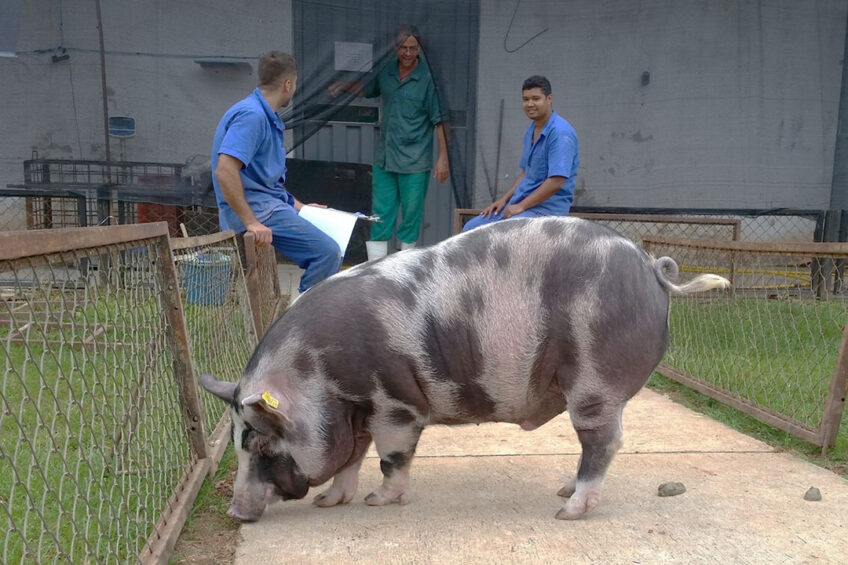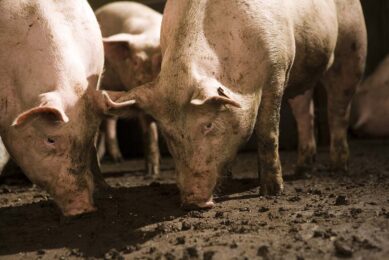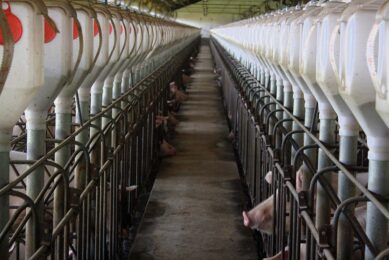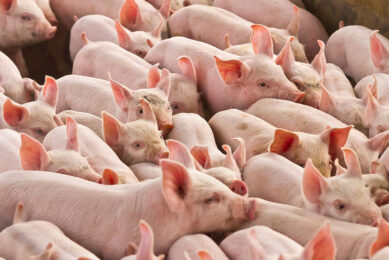Brazilian Piau pig breed maintains FCR under heat stress

A group of researchers has shown that the Brazilian native purebred Piau pig maintains its feed conversion and has a lower reduction of feed intake under heat stress conditions.
That was the conclusion of a study conducted by Brazilian researchers attached to the Universidade Federal dos Vales do Jequitinhonha e Mucuri and the Universidade Federal de Viçosa, both in Minas Gerais state. The study was recently published in the peer-reviewed Journal of Thermal Biology and compared this breed’s performance under different environmental circumstances. Goal was to understand how the Piau adult animals manage to adapt to high temperatures. This feature is important to learn more about the mitigation of negative effects of heat stress on pig welfare, physiology and performance.
Piau pigs: a breed native to Brazil
The Piau pig is a breed native to Brazil and is characterised by its adaptability and resistance to diseases. For the trial, the scientists allocated purebred pigs (65 kg initial weight) to 1 of 2 temperature conditions for 15 days:
- Thermoneutral (22°C); and
- Heat stress (30°C).
Pigs were individually weighed at the beginning and end of the experimental period. Body and rectal temperatures, respiratory rate and blood indicators of stress and metabolism were measured during the experiment. That way, the researchers could observe and understand the underlying mechanisms underlying of the pigs’ thermotolerance.
Piau pigs have lower performance parameters
Worth noting is that Piau pigs normally have markedly lower performance parameters than what is usually reported in commercial genotypes. For instance, where commercial pigs (70 kg bodyweight) can achieve a daily weight gain of 1kg/day and a Feed Conversion Rate of 2.1 g/g, Piau pigs kept at 22°C normally achieve 617 g/d of daily weight gain and an FCR of 4.14.
Nonetheless, in the case of the study, the Piau breed presented a lower feed intake reduction at higher temperatures in comparison to commercial breeds and kept its feed conversion.

Results showed that the Piau pigs had a reduction of 326 g/d in feed intake and 100 g/d in daily weight gain when kept at 30°C of ambient temperature compared to 22°C. The feed conversion rate was 4.23 g/g in both conditions (at 22ºC or 30ºC). Regarding the weight gain, pigs exposed to 30°C gained 517g/day, while, at 22ºC, they increased 617g/day. It means a 16.3% of heat-related performance decrease.
Commercial pigs lost more growth performance
In the research paper, the scientists wrote, “A greater magnitude of heat stress negative effects in growth performance was reported in commercial growing-finishing pigs. Other studies reported an overall reduction of 90 and 34 g/day in feed intake and daily weight gain per each increased degree from 23 to 30°C in 40-90 kg body weight commercial pigs.”
Based on a meta-analytic study, the authors suggested that a reduction of 440 and 220 g/d in feed intake and daily weight gain, respectively, would be expected in commercial pigs with a body weight of 70 kg when exposed to an ambient temperature of 30ºC.
Higher temperatures and respiratory rate
Piau pigs at 30ºC degrees were observed to have an increased nape, dorsal, flank and rectal temperatures and a higher respiratory rate than their counterparts reared at 22ºC. However, animals under both conditions had a similar backfat thickness and loin area.

Finally, the results show that the Piau purebred pigs acclimatisation at 30ºC is characterised by an increased skin temperature and higher respiratory rate, and moreover, by a reduced voluntary feed intake.
Heat stress relevance
Despite consistent studies regarding heat stress effects on pigs, local breeds have had little attention, despite they could reveal well adaptation for several conditions, included extreme temperatures.
In the case of tropical climate, Piau pure breed pigs have a decreased thermoregulatory response (respiratory rate, body temperatures) and higher “heat-tolerance’ in comparison to temperate-climate adapted genotypes.
Anyhow, it is not clear enough if that increased thermotolerance of Piau comes from a greater capacity to balance thermogenesis, thermolysis and protective processes or is a consequence of their low production level. The understanding of those issues could be important even to develop better genetic solutions and animal management practices for producers in general.
The research article was authored by specialists Alípio dos Reis Teixeira and Vinícius Eduardo Moreira, Universidade Federal dos Vales do Jequitinhonha e Mucuri, Brazil; and Renata Veroneze, Lorena Duarte Campos, Sábata Cristina Januario Raimundi and Paulo Henrique Reis Furtado Campos, Universidade Federal de Viçosa, Brazil.
 Beheer
Beheer









 WP Admin
WP Admin  Bewerk bericht
Bewerk bericht